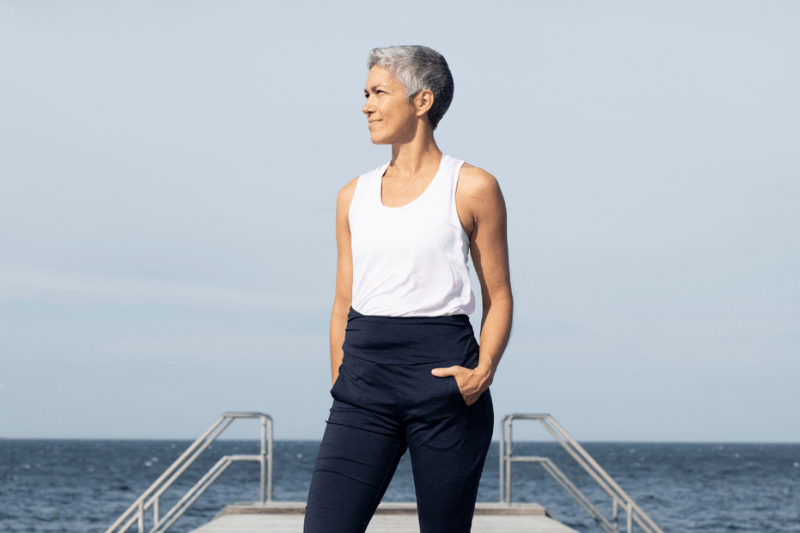Most of us know that we should ideally be eating our 5-a-day and having a varied diet to help support our overall health. But did you know there are certain foods that can be helpful for women’s health during particular life stages and phases, such as menstrual cycles or the menopause? There are also some foods that women should include in their diets, no matter their age, to help support their bodies in later life and in ageing well.
We’re looking at 5 foods that can benefit women’s health and why…
1) Legumes and beans – red kidney beans, lentils and chickpeas
Why: a good source of iron1
When: any age, but in particular during menstrual years
Benefit: important in making red blood cells that carry oxygen around your body
Adult women aged 19-50 years have higher requirements for iron compared to men and older women. This is due to women’s menstrual cycles where iron levels drop during this time, especially if they have heavy periods or have a diet low in iron.2
Heavier periods can increase the risk of iron deficiency anaemia where symptoms include tiredness, headaches and shortness of breath.3
>Find out more about the 4 phases of the menstrual cycle and which hormones are affected.
Amount of iron needed:
- 14.8mg a day for women aged 19 to 49
- 8.7mg a day for women aged 50 and over1
Please note some of the below food isn't advised if you're pregnant or breastfeeding, more info can be found here: Foods to avoid in pregnancy - NHS
Other sources of iron
- red meat,
- soya beans,
- nuts,
- fortified breakfast cereals,
- liver (although avoid when pregnant),
- shellfish.
2) Oily fish – salmon, sardines, trout and mackerel
Why: helps lower cholesterol
When: any age, but in particular after the menopause can be beneficial.
Benefit: a good source of healthy unsaturated fats which can help lower cholesterol.4
A diet high in saturated fats can raise cholesterol levels and increase the risk of heart disease which can then result in a heart attack.5
According to the British Heart Foundation, “Coronary heart disease kills more than twice as many women in the UK as breast cancer.”6
There are ways to lower high cholesterol levels such as healthy eating, exercise, not smoking and maintaining a healthy weight. But there are some things we can’t control:
- Getting older – having higher cholesterol is more likely as we age.
- The menopause – during and after the menopause women's risk of high cholesterol goes up.
- Your family history – you may inherit a condition that causes high cholesterol from your parents.5
Ensuring we eat the right fruit, vegetables and adding in oily fish such as mackerel into our diets can help keep cholesterol in check.
>Read more about which foods can help reduce cholesterol
Other benefits of oily fish
- A good source of vitamin D
- Some oily fish contain bones that you can eat, for example whitebait, canned sardines, pilchards and tinned salmon. These fish can help keep our bones strong because they are sources of calcium and phosphorus.7
3) Dairy – cheese, milk and yoghurt
Why: rich in calcium
When: any age
Benefit: calcium is important in building and maintaining strong bones and teeth. Making sure we consume enough calcium can also help prevent loss of bone strength (osteoporosis) as we age.8 Most people will reach their peak bone mass between the ages of 25 and 30. By the time we reach age 40, we slowly begin to lose bone mass.9
Looking after our bones through diet, exercise and the right lifestyle choices can help lower the risk of osteoporosis. Women are also more at risk, especially if menopause began before the age of 45 years old, as oestrogen levels fall after the menopause, causing a decrease in bone density.10
Dairy is the richest source of calcium but if you’re dairy intolerant or follow a vegan diet then other sources of calcium include:
- fortified plant-based milk alternatives,
- broccoli,
- kale,
- tofu,
- nuts and seeds, such as Brazil nuts, almonds and sesame seeds,
- fish with edible bones such as sardines.
4) Whole grains – oats, wholemeal, wholewheat pasta and brown rice
Why: full of fibre, vitamin B and folic acid
When: any age
Benefit: the risk of heart disease, stroke and type 2 diabetes may be up to 30% lower in people who regularly eat wholegrains as part of a low-fat diet and healthy lifestyle.11
There is also thought to be a reduced risk of bowel cancer when consuming higher amounts of wholegrains. As the fibre helps move food along, reducing the time that damaging substances are in contact with the gut wall.11
Fibre also helps keep our digestive system healthy and prevents constipation.
B vitamins
B1 (thiamine) – can be found in wholegrain breads, and helps:
- the body break down and release energy from food,
- keep the nervous system healthy.12
Folic acid – a B vitamin which is vital for the formation of red blood cells. It supports growth and cell division in the body.13
Folic acid naturally found in food is called folate, and we should get enough folate from a healthy and varied diet. However, women looking to get pregnant should take a 400-microgram supplement of folic acid every day before they get pregnant, and every day afterwards, up until 12 weeks pregnant.
This helps the neural tube develop, which becomes the baby’s brain and spine.
5) Nuts and seeds – almonds, pistachios, hazelnuts, sunflower seeds and pine nuts
Why: full of vitamin E
When: any age
Benefit: there’s some evidence that supports a link between diet and brain processes such as our thinking or cognitive skills. Specific nutrients in food such as omega-3 fatty acids, vitamins B, D and E, have been associated with improved cognitive function in older people.14 Although more research is needed in this area.
Further studies are also being carried out specifically on vitamin E, and whether they might help older adults remain mentally alert and active, as well as prevent or slow the decline of mental function and Alzheimer’s disease.15
Women have a greater risk of developing dementia during their lifetime and, compared to men, are twice as likely to have Alzheimer’s disease. With age and women living longer being the biggest risk factor.16
Menopause is also thought to be a factor that can contribute to Alzheimer’s disease, as oestrogen and progesterone levels decline during menopause. Oestrogen is thought to have a range of protective effects on brain health, including an ability to block some of the harmful effects of substances involved in Alzheimer’s disease.
Other benefits
- Digestive health – almonds, pistachios and hazelnuts are full of fibre which help keep the gut healthy by regulating bowel movements and encouraging healthy gut microbiome.17
These are just some of the foods that can help towards an overall healthy diet for women. There are, however, plenty of foods which are packed with essential vitamins, minerals, antioxidants, and other vital nutrients. So having a balanced and varied diet will ensure that you’re getting the most nutritional quality.
Explore our diet and nutrition hub for more insights and tips on nutrition and eating well.
References
- Iron – NHS
- Recommendations for women – British Nutrition Foundation
- Iron deficiency anaemia – NHS
- Six cholesterol-busting foods – Heart UK
- High cholesterol - symptoms, causes and levels – British Heart Foundation
- UK factsheet – British Heart Foundation
- Fish and shellfish – NHS
- Calcium-rich food – Patient Info
- Healthy Bones at Every Age – OrthoInfo
- Who's at risk of osteoporosis – NHS
- What are wholegrains – The Association of UK Dietitians
- Thiamin (vitamin B1) – NHS
- Folic acid – The Association of UK Dietitians
- Diet and brain health – Age UK
- Vitamin E – National Institutes of Health
- Why is dementia different for women? – Alzheimer’s Society
- Eat these 10 healthiest nuts for better gut health and immunity – Women’s Health














